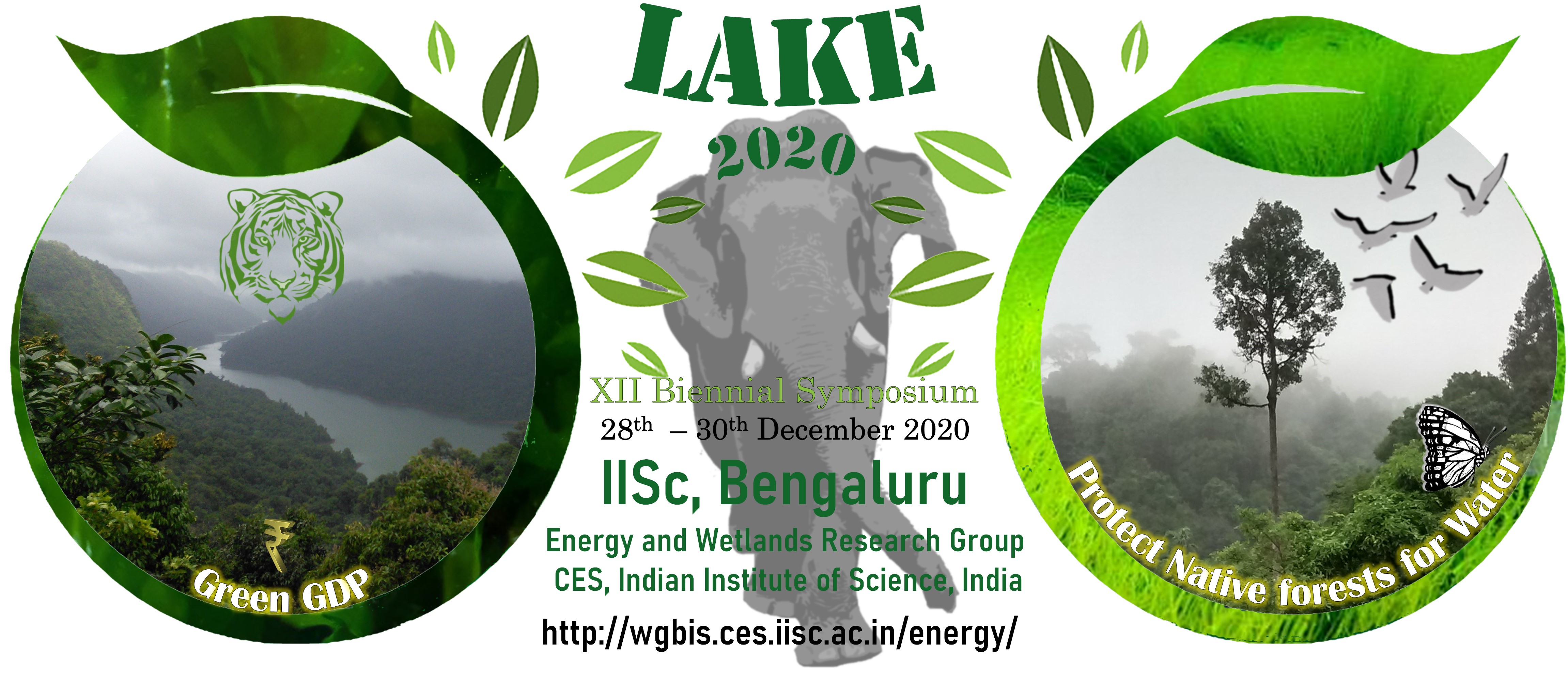
The 12th Biennial Lake Conference
Date: 28-30th December 2020
Venue : Auditorium, Ground Floor, New Biological Sciences Building [Near D Gate],
Indian Institute of Science, Bangalore 560012,
Phone: +91 080-22933503/22933099
Symposium Web: http://wgbis.ces.iisc.ernet.in/energy
Lake 2020 will be the 12thBiennial Lake Conference focusing on “Ecosystem Structure, Function, Goods and Services” will be held at the Auditorium, ground Floor, New Biological Sciences Building [Near D Gate]. The theme of World Wetlands day 2020 is “Wetlands and Biodiversity” to demonstrate the vital role of wetlands for the future of humanity and specifically their relevance towards achieving the new Sustainable Development Goals. Lake 2020 conference provides a unique opportunity to increase understanding of the role of ecosystems in sustaining the food, water and human livelihood with the challenges faced by these fragile ecosystems.
Ecosystem is a complex function unit that dynamically respond as per interaction among living (biotic-plant, animal and micro-organism communities) and non-living components (abiotic- sunlight, water, air, minerals and nutrients). The quantity (biomass, productivity), quality (pristine/polluted) and diversity of species (e.g. richness, rarity) governs the ecosystem functions. Biodiversity is the variety of ecosystems, species, and genes recognised as one of the critical elements for human existence as it accountable for vital goods and services such as food, water, timber, carbon sequestration, wastewater purification, soil formation, pollination, etc. The degradation of these vital ecosystems is linked to continuing problems of land cover changes, deforestation, habitat fragmentation, pollution, indiscriminate disposal of liquid and solid wastes, and issues related to economic productivity and ecological security. The structural changes in the ecosystem due to land cover changes, will influence the functional aspects namely hydrology, bio-geo chemical and nutrient cycle, which are evident in many regions in the form of conversion of perennial streams to seasonal and disappearance of water bodies leading to a serious water crisis.
Scope: Lake 2020: Conference on Ecosystem Structure, Function, Goods and Services ‘demonstrate the vital role of ecosystems for the future of humanity and specifically their relevance towards achieving the new Sustainable Development Goals. Lake 2020 conference provides a unique opportunity to increase understanding of the role of ecosystems in sustaining the food and water with the challenges faced by these fragile ecosystems. Lake 2020 would focus not only on updating of the current knowledge of the scientific community and also would bring in awareness among students, teachers and public. This would provide a platform for interaction among researchers, policy makers, academics and NGOs and address the issues related to wetlands and biodiversity in an era of climate change. This would help in developing a stronger network among experts and institutions to develop efficient strategies for the conservation and management of fragile ecosystems. As a part of the conference it has been decided to have theme-based lead lectures by the eminent scholars, paper and poster presentations by researchers, school and college students.
THEMES: Papers are invited on the following themes from researchers, faculty from universities, Research Scholars, planners, development managers, economists and social scientists, school (VIII – XII students) and college (UG and PG) students, school and college teachers.
Topics for Paper Presentation/ Poster in Lake 2020:
- Ecosystem structure and function.
- Ecosystem (terrestrial, aquatic – coastal, fresh water) Goods and services.
- Biodiversity, Hydrology and Ecology of Western Ghats.
- Aquatic and Terrestrial Ecosystems: Linkages.
- Aquatic Ecosystems – Food and water security, people’s livelihood.
- Wetlands and swamps: Restoration, Conservation and Management.
- Land use, Land cover dynamics.
- Carrying capacity of river basins in Western Ghats.
- Valuation of Ecosystem Goods and services.
- Sacred Groves (kans, devarakadu) and Myristica Swamps.
- Eco-Tourism in Western Ghats and Carbon sequestration.
- Application of Geoinformatics in Ecosystems Management.
- Natural and Anthropogenic disasters.
- Limnology, aquatic ecology, biodiversity and prospects of bio-monitoring.
- Pollution –terrestrial and aquatic – Monitoring and Management, bioremediation.
- Sustainable Agriculture and Organic farming.
- Coastal ecosystems – Biodiversity, Ecology, Productivity and Livelihood aspects.
- Prospects of Renewable Energy (solar, biofuel, bioenergy) and Energy Conservation.
- Environmental Education and Sustainable Development.
- Environment Ethics and Green Technology; and Environment Literacy
Details are at http://wgbis.ces.iisc.ernet.in/energy


